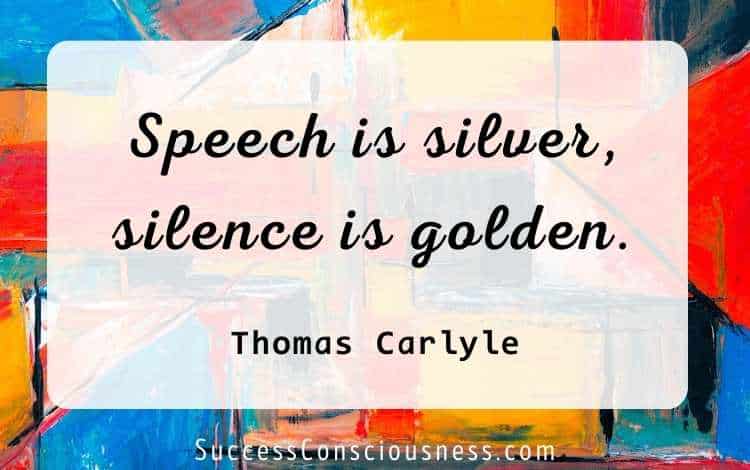
Silence has become a rare and invaluable commodity in a world filled with constant noise and distractions. It is said that “silence is golden,” and for good reason.
Not only does silence provide a much-needed break from the chaos of everyday life, but it also has the power to heal, inspire, and awaken our inner selves.
A practical, powerful guide to using creative visualization to reshape your inner world and transform your life. Discover the Guide
The Meaning and Significance of “Silence Is Golden”
Silence is not merely the absence of sound but a state of inner stillness and tranquility. It is a sanctuary where we can retreat to find solace and clarity amidst the chaos.
In silence, we can listen to the whispers of our souls and connect with our deepest thoughts and desires.
Silence is a powerful tool that allows us to slow down, reflect, and gain perspective.
Silence provides a much-needed respite in a world where we are constantly bombarded with information and stimuli. It enables us to recharge, rejuvenate, and reconnect with ourselves and the world around us.
“Speech is silver, silence is golden.”
– Thomas Carlyle
Real-Life Examples of the Power of Silence
Throughout history, there have been people who have harnessed the power of silence to achieve greatness. Take, for example, Mahatma Gandhi, who used silence as a form of protest to convey his message of non-violence. His silent marches and fasts spoke volumes and profoundly impacted the world.
Similarly, the renowned physicist Albert Einstein often sought solitude and silence to fuel his creativity and scientific breakthroughs. He once said, “I live in that solitude which is painful in youth but delicious in the years of maturity.”
Some people seek silence by practicing meditation and other disciplinary practices to help them gain control over their minds, attention, and thoughts.
Silence in Spiritual Awakening and Meditation
Silence plays a vital role in the practice of meditation and spiritual awakening. Through silence, we can transcend the noise of our thoughts and experience a sense of inner peace and oneness with the universe.
By focusing our attention inward and silencing the mind, we cultivate mindfulness and gain insight into our true nature.
In meditation, silence becomes the canvas on which we paint the landscape of our inner world. In the stillness of silence, we can observe our thoughts, emotions, and sensations without judgment or attachment.
Through this observation, we gain a deeper understanding of ourselves and the nature of reality.
Related article: Spiritual Awakening: How to Live with Presence and Clarity.
The Benefits of Silencing the Mind
Silencing the mind has numerous benefits for our overall well-being.
When we quiet the constant chatter of our thoughts, we create space for clarity and insight to arise. We become more present and aware of the present moment, allowing us to fully engage with life and experience greater joy and fulfillment.
Furthermore, silence helps to reduce stress and anxiety. Amid silence, our nervous system relaxes, and our body and mind enter a state of deep relaxation.
This state of relaxation profoundly impacts our physical, mental, and emotional well-being, leading to improved sleep, increased focus, and enhanced creativity.

Quiet the Mental Noise and Find Your Inner Calm.
Calm Your Racing Thoughts and Find PeaceTechniques for Achieving Silence Through Meditation
To embrace the power of silence, we can incorporate meditation techniques into our daily routine. One simple yet effective technique is mindfulness meditation, where we bring our attention to the present moment and observe our thoughts and sensations without judgment.
Another technique is mantra meditation, where we repeat a chosen word or phrase to quiet the mind and enter a state of deep stillness.
By focusing our attention on the mantra, we can transcend the noise of our thoughts and experience a profound sense of peace and clarity.

Quiet the Mental Noise and Find Your Inner Calm.
Calm Your Racing Thoughts and Find PeaceConcentration Exercises to Cultivate Inner Silence
In addition to meditation, concentration exercises can help cultivate inner silence. One such exercise is focusing on the breath. By directing our attention to the sensation of the breath entering and leaving our body, we can anchor our awareness in the present moment and quiet the mind.
Visualization exercises can also be used to cultivate inner silence. By visualizing a peaceful and serene place, such as a beach or a forest, we can create a mental sanctuary where the mind can find stillness and tranquility.
Integrating Silence into Daily Life
While dedicated meditation practice is essential, it is equally important to integrate moments of silence into our daily lives. We can create designated periods of silence, such as early mornings or evenings, where we disconnect from technology and external distractions and embrace the serenity of silence.
We can also incorporate silent activities into our routines, such as taking mindful walks in nature or engaging in hobbies that promote stillness and introspection.
By intentionally creating space for silence, we allow ourselves to recharge and connect with our inner selves. Silence is golden. It is something precious that everyone needs.
Quotes About the Value of Silence
Many great thinkers and spiritual leaders have emphasized that silence is golden.
Many teachers, philosophers, and people in various areas of life have found that silence is golden and worth cultivating.
The ancient Chinese philosopher Lao Tzu said, “Silence is a source of great strength.”
His words remind us that we tap into a well of inner power and wisdom in moments of silence.
The poet Rumi also recognized the transformative power of silence. He wrote, “Silence is the language of God, all else is poor translation.”
These words remind us that silence is not empty; it is a language that transcends words and connects us to something greater than ourselves.
The great Indian spiritual teacher Sri Ramana Maharshi said about silence the following words:
“Silence is never-ending speech.”
“Silence is most powerful. Speech is always less powerful than silence.”
“Remain still, with the conviction that the Self shines as everything yet nothing, within, without, and everywhere.”
This speaks about the importance of the power of silence.
Overcoming Challenges in Achieving Inner Silence
Silencing the mind can be challenging, especially in a world of constant noise and distractions. However, it is possible to cultivate inner silence with practice and patience.
It is important to approach the practice with a gentle and compassionate mindset, without expectations or judgments.
If thoughts arise during meditation or moments of silence, acknowledge them without attaching to them and gently guide your attention back to the present moment.
Remember that silence is not about eliminating thoughts completely but rather creating a space where they can come and go without disturbing our inner stillness.
Conclusion: Silence Is Golden: Embracing the Power of Silence
Silence is often overlooked and undervalued in a world that values noise and constant stimulation. However, silence is not emptiness. It is a source of great strength, wisdom, and healing.
By embracing the power of silence, we can tap into our innermost selves, cultivate mindfulness, and experience a profound sense of peace and connection. Truly, silence is golden, which means it’s worth like gold and even more.
Online Meditation Course: The Path to Awakening
Meditation techniques with guidance for finding inner peace, expanding consciousness, and awakening.
Through practices such as meditation and concentration exercises, we can silence the mind and create space for reflection, self-discovery, and spiritual awakening.
Integrating moments of silence into our daily lives allows us to find solace amidst the chaos and reconnect with our true nature.
In a world that rarely allows for quietude, remember that silence is golden. Take the time to embrace stillness, listen to the whispers of your soul, and discover the transformative power of silence.

Quiet the Mental Noise and Find Your Inner Calm.
Calm Your Racing Thoughts and Find PeaceOur inspiring online courses and eBooks help you go beyond words, into clarity, calm, focus, inner strength, success, and real personal growth.

